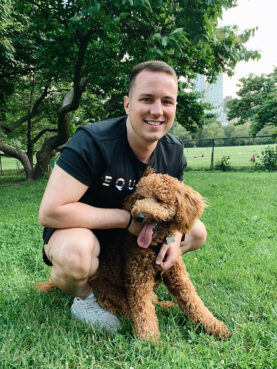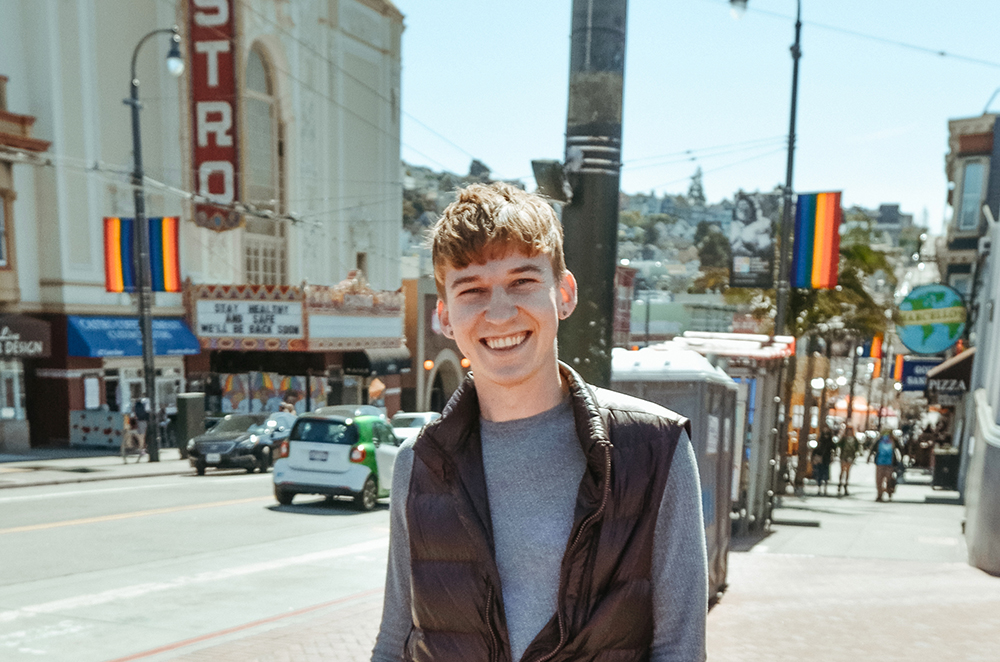(RNS) — For Ethan Stalker, the break unfolded in a now familiar way.
On March 18, 2019, Stalker announced on a blog post he was gay. The next day, he got invited to a coffee meeting with a pastor at the evangelical church in New York City where he was serving as a lay leader. The pastor told him he no longer qualified to be a small group leader.
His life choices, he was told, were not “God’s best” for him. The church allowed the 25-year-old, who works in marketing for healthcare companies, to continue to volunteer on its broadcast production team.
Three months later, Stalker quit the church.
“They loved to tell me my sexuality doesn’t define me,” Stalker said. “But they shoved a handful of verses down my throat that completely sexualize me as a gay person and put a cap on what I can do. It dismissed who I am as a complex human being. That was a huge problem for me.”

Ethan Stalker. Courtesy photo
Stalker’s story is one shared by thousands of LGBTQ young people who grew up in evangelical churches that deny them full participation. LGBTQ people are typically excluded from serving on church boards and from leading worship or other church groups. They are not ordained or allowed to marry same-sex partners in the church. That’s causing many younger evangelicals — gay and straight — to question the integrity of their church’s theology and the consistency of its biblical interpretation.
Amid widespread acceptance of LGBTQ people, evangelical church attitudes toward the group have not budged, and the consequences have been dire.
A study last month by the Public Religion Research Institute found the number of Americans who identify as white evangelicals has declined dramatically, from 23% in 2006 to 14.5% in 2020. Those leaving in the greatest numbers are younger evangelicals whose attitudes toward sexual minorities are starkly at odds with their elders. Take same-sex marriage: While only one-third (34%) of white evangelicals age 50 and over favor same-sex marriage, 51% of younger white evangelicals ages 18-49 now favor it — a majority, another PRRI study found.
RELATED: Survey: White mainline Protestants outnumber white evangelicals, while ‘nones’ shrink
To be sure, evangelicals, like people of all faiths, leave church for many reasons: changing politics, shifting cultural tastes, spiritual restlessness. But among younger evangelicals, the church’s attitude on sexuality is emerging as one of the big causes for the decline.

Julie Rodgers. Courtesy photo
“Most people know and love someone who’s openly gay,” said Julie Rodgers, a Christian writer, activist and lesbian whose story is featured in the new documentary on Netflix, “Pray Away.” “It causes them to wrestle with the implication of teachings that say, ‘We’re bad and wrong and sinful.’ It creates a significant conflict for them in a way that (evangelical allegiance to) the Republican Party more broadly feels like an abstraction, and they don’t see the effect of that on human beings they know and love.”
In contrast with most mainline Protestant denominations where LGBTQ members are routinely ordained and their marriages solemnized in church (the United Methodist Church being the exception), white evangelical denominations such as the Southern Baptist Convention, the Presbyterian Church in America, the Anglican Church in North America and dozens of others have resisted offering gay people equality. LGBTQ people are allowed to attend church, to be baptized and in most cases to take Communion — but not much else. All three denominations doubled down on their opposition to fully affirming LGBTQ people at their annual conferences this summer.
In evangelical circles, LGBTQ equality has become the litmus test. Churches that stray from those policies risk losing their evangelical bonafides.
“If you make space for marrying or ordaining queer clergy or parishioners, you’re now decidedly out of the evangelical world,” said Michael Rudzena, pastor of Good Shepherd New York, a non-denominational church that is welcoming for LGBTQ people, many of them fleeing evangelical congregations.
One of the hallmarks of evangelicalism is its high view of Scripture. Evangelicals take the Bible to be the literal or authoritative word of God. That leads them to highlight a handful of passages that condemn gay sex.
Yet many evangelicals have found a way to embrace and minister to divorced people, even though the Bible, and Jesus, specifically, frowns on it.
“There’s some selective literalism that ignores divorce and remarriage but can’t make the adjustment on this yet,” said the Rev. Fred Harrell, pastor of City Church San Francisco, a Reformed Church in America congregation that fully affirms LGBTQ people.
City Church decided in 2015 to be a fully inclusive church. Overnight it lost 300 members. Its $5.8 million annual budget shrunk to about $2.8 million today. It laid off staff, cut other people’s salaries and had to shut down one of its campuses. Yet, Harrell said he has no regrets. About 15% of the church’s 336 members (with another 360 who attend but do not belong) identify as LGBTQ. Harrell said they’re among the most active and dedicated members.
“They’re really solid people who have been an enormous blessing to the church,” Harrell said. “I tell my non-affirming friends, ‘You’re really missing out.’”
City Church is one of a handful of churches once considered evangelical that have offered LGBTQ full inclusion. GracePointe in Nashville and EastLake Community Church in Seattle are two others that broke from the evangelical pack at the same time. The toll was steep. In the four years that followed — years that coincided with the Trump administration — few others made the move.
That’s not to say there have been no shifts on the part of evangelicals.
Conversion therapy, the discredited practice of attempting to change someone’s sexual orientation or gender identity, has increasingly come under fire, as the documentary “Pray Away” reveals. At least 20 states have banned the practice among minors. Once a common approach embraced by many churches, conversion therapy has even been denounced by evangelical elites such as Russell Moore, formerly the Southern Baptist Convention’s top ethicist.
In addition, more Christian publishers — such as Convergent, HarperOne, Broadleaf and Eerdmans — are willing to publish books affirming LGBTQ Christians.
Those changes have been too little, too late for some.

James Dawkins. Courtesy photo
Jake Dawkins, a 26-year-old software engineer from Greenville, South Carolina, who growing up attended evangelical churches, dropped out over the churches’ view on sexuality. A straight man, he lived for a while in New York City where he met lots of committed gay Christians.
“Meeting people with different viewpoints opened my mind up to what Christianity could be,” Dawkins said. “That started separating me from more traditional Christianity. That disconnect or discomfort that I felt with the church gave me the opportunity to recognize other things about the church I wasn’t a fan of.”
Jonathan Merritt, a senior columnist at Religion News Service and a contributing writer for The Atlantic, who recently came out as gay, said he foresees a gradual evolution in evangelical circles.
Churches might begin treating LGBTQ people as they do divorced people, directing them to support groups and allowing them to take on service-oriented projects.
“At the end of the day, the history of evangelicalism is a history of pragmatism,” Merritt said.
Just as the churches once opposed rock music — now ubiquitous in the form of Christian rock or praise songs — so, too, evangelical resistance to LGBTQ people may soften.
The question is whether that will happen quickly enough for the people who are fed up with the homophobia still tolerated in evangelical circles.
Elliot Rossomme, a 26-year-old gay man who had been attending a nondenominational evangelical church while studying for a graduate degree in chemistry at the University of California, Berkeley, made the break two years ago.
He had grown up in an evangelical church in the suburbs of Pittsburgh, Pennsylvania. When he got to Berkeley he noticed the church he was attending never discussed sexuality. So he proposed leading a support group for LGBTQ members. He was told he could start the group, so long as he forswore dating, promised he wouldn’t disparage the theological position of the church or advocate for other positions. (Some evangelical churches have accepted the reality of same-sex attraction but require gays to be celibate if they are to serve in leadership positions.)

Elliot Rossomme. Courtesy photo
“That day, I realized I couldn’t go to that church anymore,” Rossomme said.
Two years ago, he decided to try City Church San Francisco. At the end of the first service he attended, as the Eucharist, or the bread and the wine, was about to be celebrated, he said he cried.
“There was a sense that I don’t have to fight for my place at this table here, and they want me to come forward and don’t have qualms about me participating in this meal,” he said.
Here, he no longer felt like a theological outsider and could dedicate positive energy toward building a community he believes in. He joined the church.
Ethan Stalker, the New York City marketer, has also found his way to a church — Good Shepherd New York, which welcomes a number of LGBTQ refugees.
But after volunteering all his life for various church projects (he was a theology major at Anderson University in South Carolina, a Christian school) and finding all his social connections through church, he’s more tentative now.
“I’m still recovering and working through the hurt and trauma I experienced being in leadership roles at churches,” Stalker said. “I’m not sure if I will ever be ready to step back into a leadership role. I’d like to think one day I will be able to, but only time will tell.”





